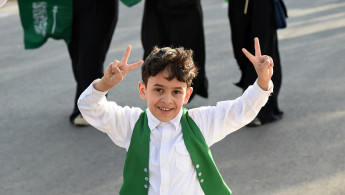What is Saudi Founding Day celebrated on February 22?
Saudi Arabia today, February 22, is marking the second annual celebration of Founding Day [Yawm al-Ta'sis يوم التأسيس].
This relatively new holiday, established in 2022, commemorates the enthronement of Imam Muhammad bin Saud in 1727, laying the groundwork for the First Saudi State and ultimately the modern Kingdom ruled by the House of Saud royal family.
Distinct from National Day, which celebrates the unification of the Kingdom in 1932, Founding Day offers a glimpse into the nation's historical roots.
Streets and buildings are adorned with the national colours, while cultural performances and exhibitions transport visitors back to the early days of the First Saudi State.
Official ceremonies in major cities see patriotic parades and speeches. It is also marked by an extravagant fireworks display.
Analysts see it as part of the kingdom's attempts to foster a new sense of Saudi identity and nationalism, under King Salman and his son, Crown Prince and de facto ruler Mohammed bin Salman (MBS).
Critics, meanwhile, say this top-down approach to building a national identity simplifies a complex history, glossing over internal conflicts and external influences, coalescing it instead around the history of the ruling family.
Through the 20th century, the Saudis refused nationalism as a threat to the monarchy and rather relied on old tribal connections and powerful influences of religion.
Saudi rulers feared that the absolute monarchy system would be greatly challenged with the spread of pan-Arab nationalism and identification with the nation-state rather than with the monarchy itself.
Martin Kramer, the Koret Distinguished Fellow at The Washington Institute for Near East Policy and authority on the history and politics of the Middle East, reminds us, however, that no one has claimed that a "Saudi nation" actually exists.
"There is a Saudi royal family and a Saudi monarchy. There is a Saudi nationality in a legal sense, but not a Saudi nation in the moral sense. Sovereignty has not rested with the people, but with God, delegated to an alliance of the religious establishment and the Saudi house," he told The New Arab in 2020.
The nation-building through promoting of nationalism has been introduced as a solution that would cope with new challenges and preserve the monarchy.
This same drive complements Saudi National Vision 2030, a socio-economic reform roadmap to wean the kingdom off oil revenues and diversify its economy. It has seen the kingdom embark on controversial megaprojects, wholesale recruitment of international football stars to play in the kingdom's premier league, and opening up freedoms from the right to drive for women to relicensing cinemas.





 Follow the Middle East's top stories in English at The New Arab on Google News
Follow the Middle East's top stories in English at The New Arab on Google News


